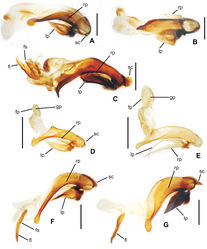Meonochilus spiculatus
| Notice: | This page is derived from the original publication listed below, whose author(s) should always be credited. Further contributors may edit and improve the content of this page and, consequently, need to be credited as well (see page history). Any assessment of factual correctness requires a careful review of the original article as well as of subsequent contributions.
If you are uncertain whether your planned contribution is correct or not, we suggest that you use the associated discussion page instead of editing the page directly. This page should be cited as follows (rationale):
Citation formats to copy and paste
BibTeX: @article{Liebherr2011ZooKeys147, RIS/ Endnote: TY - JOUR Wikipedia/ Citizendium: <ref name="Liebherr2011ZooKeys147">{{Citation See also the citation download page at the journal. |
Ordo: Coleoptera
Familia: Carabidae
Genus: Meonochilus
Name
Meonochilus spiculatus Liebherr, 2011 sp. n. – Wikispecies link – ZooBank link – Pensoft Profile
Diagnosis
Individuals of this species are best told by the narrow pronotal and elytral bases, resulting in a medially constricted body shape (Fig. 9B). The suboviform elytra have deep, distinctly punctate striae and convex discal intervals with glossy surfaces. The antennae are moderately elongate, not submoniliform, with 9th antennomere length 2.3× maximum breadth. The male aedeagal internal sac bears a long, stout, spikelike flagellum, and the median lobe apex terminates in a narrow, symmetrically rounded bulblike tip (Fig. 2F). This species exhibits a distribution parapatric to Meonochilus amplipennis in Bay of Plenty (Fig. 13, 15), but Meonochilus spiculatus can be easily diagnosed by its smaller body size–standardized body length 5.7–5.9 mm versus 6.1–6.9 mm–and through comparison of male aedeagal apices, Meonochilus amplipennis being characterized by an asymmetrical apicoventrally directed expansion (Fig. 2A).
Male Genitalia
(n = 2). Aedeagal median lobe with narrowly elongate sagittal crest, shaft of lobe narrow and straight in apical half, terminated in a symmetrically rounded apex; internal sac with spikelike flagellum and closely appressed flagellar sheath (Fig. 2F), the sac narrowly extended beyond flagellar point of insertion; a rolled crescent of membrane bearing short, stout spikelike microtrichia present immediately to right of flagellar base (brush sclerite; Lindroth 1976[1]); ventral, right paramere short, length about ½ distance from point of parameral articulation to external face of apex, ventral and dorsal edges subparallel, apex rounded, 6–8 setae on ventral margin (those closer to base shorter), adjacent to 9–14 large setae arrayed on rounded apex, and with 2–5 very short setae in apical half of dorsal edge; dorsal left paramere subconchoid, broad basally with apex narrowly rounded, little extended, and 2 larger setae on dorsal surface at tip, and 2 smaller setae just basad.
Female Reproductive Tract
(n = 1) Bursa copulatrix narrowed apically to bulbous, appressed spermatheca, distance from gonocoxal bases to apical spermatheca 1.6× greatest width of bursa at juncture with common oviduct (Fig. 4A); common oviduct broadest at juncture with bursa, heavily membranous based on dense staining with Chlorazol Black; spermatheca a broadly rounded protuberance situated on apex of bursa, the spermathecal gland duct entering directly into the protuberance; spermathecal gland duct approximately twice as long as apical ductile reservoir; basal gonocoxite 1 with lateroapical series of 3 setae, 2 larger and 1 smaller, each side, and medioapical series of 3–5 setae extended along apical half of dorsomedial surface (Fig. 14A); apical gonocoxite 2 with 2 broad lateral ensiform setae, and 1 dorsal ensiform seta on dorsal surface; apical sensory furrow bearing 2 nematiform seta at 0.70× coxite length.
Holotype
Male (NZAC), dissected and mounted on 3-line platen, genitalia enclosed in polyethylene vial on pin: Kaimai Range / Matamata / Waikato, N. Is., N.Z. // Coll / A.E. Brookes, / 12-4-1941. / A.E. Brookes / Collection / NZ Arthropod Collection / [bar code] / NZAC04007286 // HOLOTYPE ♂ / Meonochilus / spiculatus / det. J.K. Liebherr 2011[2] (black-bordered red label).
Paratypes
BP: Kaimai, 37°40.21'S, 175°51.80'E, 01-iii-1948, Brookes (NZAC, 1); Mt. Te Aroha, litter, 37°31.56'S, 175°43.77'E, 21-x-1967, Watt (NZAC, 1), summit, 37°32.10'S, 175°44.56'E, 950 m el., i-2002, Thorpe (AMNZ, 8), in forest at night, 5-i-2003, Thorpe (AMNZ, 2), in litter 92/6, 27-ii-1992, Dugdale (NZAC, 2), under logs and stones, 22-i-2002, Thorpe (AMNZ, 2), under wood on ground, 08-iv-2001, Thorpe (AMNZ, 1); Okauia, Matamata, E, 37°47.26'S, 175°50.35'E, 29-xii-1947, Brookes (NZAC, 1).
Etymology
The species epithet spiculatus is a Latin adjective with male ending denoting the apically pointed, spike-like flagellum of the male aedeagal internal sac.
Distribution and Habitat
This species is restricted to the Kaimai Range (Fig. 13) in the northwest edge of Bay of Plenty district (Crosby et al. 1976[3]). Specimens labeled with concise elevations are all from higher elevations, especially on Mt. Te Aroha. This species and Meonochilus amplipennis are sympatric at Te Aroha, however Meonochilus amplipennis is recorded from lower elevations (740–950 m el.) whereas Meonochilus spiculatus records are only from the summit at 950 m el. Specimens have been collected in the forest at night, in litter, and under logs, stones, and wood on the ground.
Original Description
- Liebherr, J; 2011: Cladistic assessment of subtribal affinities within the tribe Moriomorphini with description of Rossjoycea glacialis, gen. n. and sp. n. from the South Island, and revision of Meonochilus Liebherr and Marris from the North Island, New Zealand (Coleoptera, Carabidae) ZooKeys, 147: 277-335. doi
Other References
- ↑ Lindroth C (1976) Genus Bembidion Latreille (Coleoptera: Carabidae) in New Zealand: a revision. New Zealand Journal of Zoology 3: 161-198. doi: 10.1080/03014223.1976.9517912
- ↑ Liebherr J (2011) The Mecyclothorax beetles (Coleoptera: Carabidae: Moriomorphini) of West Maui, Hawaii: taxonomy, biogeography, and conservation. Deutsche Entomologische Zeitschrift 58: 15-76. doi: 10.1002/mmnd.201100005
- ↑ Crosby T, Dugdale J, Watt J (1976) Recording specimen localities in New Zealand: an arbitrary system of areas and codes defined. New Zealand Journal of Zoology 3: 69. doi: 10.1080/03014223.1976.9517903
Images
|





